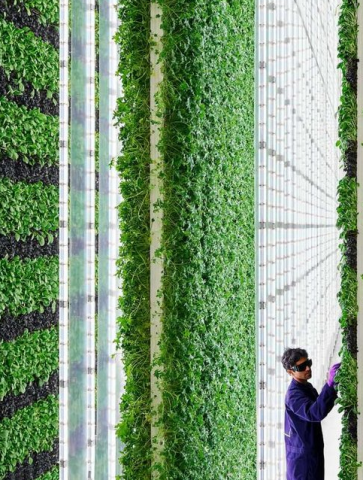“Urban and novel farms” is a sub-category of the AgTech sector. See all definitions of FoodTech and its categories here.
The “urban and novel farms” FoodTech category regroups startups developing urban and indoor farms to reduce the distance between production and consumption, increase yields, quality and sustainability.
Entrepreneurs have been thinking about the “farm of the future” for decades (if not centuries). Nowadays, we think of it as urban farming. Beyond this term are various realities:
- indoor farms which are farming facilities in controlled environments
- urban farms which are farms inside cities, can be low tech (actual farms, farming on the rooftops) or high tech.
- vertical farming which is opposed to the traditional “horizontal farming”
When we talk about urban farming, we mean the combination of the three models mentioned: indoor and vertical farms inside cities’ borders. Hence, for us, urban farming is the idea of using technology to produce food products directly on their point of consumption or distribution.

Plenty’s vertical farms
The switch from competing on technology to the best model
In DigitalFoodLab’s 2019 FoodTech trend report, we discussed the momentum around urban farming and analysed it through two sets of lenses: technology and business model.
Technology innovation is the first step to developing an urban farming startup, and we have witnessed more and more automatisation in the sector. But, last year has demonstrated that technology is not enough. Whether startups use hydroponics, aeroponics or aquaponics technology, the time has come to prove they can generate income, and eventually become profitable.
The situation is now more straightforward than it was a year ago, and startups are now betting their revenue streams either on:
- B2C models: startups who sell their production of microgreens, vegetables, strawberries, etc. directly to consumers through retailers, notably by betting on their brand power to compensate for the additional cost of their produce.
- B2B models: startups who develop farming systems and sell or lease them to larger companies, private commercial farms or academic institutions.
Key startups to consider
- Infarm (DE), modular vertical farming units that can be stacked to meet any space
- The three US indoor vertical farming startups: Plenty, AeroFarms and Bowery Farming
DigitalFoodLab’s additional insights
- 08/07/2021 – The crazy phenomenon around FoodTech SPACs
- 21/10/2020 – Urban farming leaders are raising a lot of money to scale
- 24/02/2020 –Sodexo deals with Freight Farms to build containers to grow food on US campuses
- 22/11/2019 – Vertical farming investments report
Get in Touch
We work with our clients to identify and act on the best Foodtech opportunities
By email
contact@digitalfoodlab.com
Our office
14 avenue de L’Opéra, 75001 Paris, France

